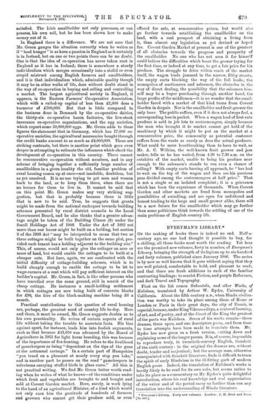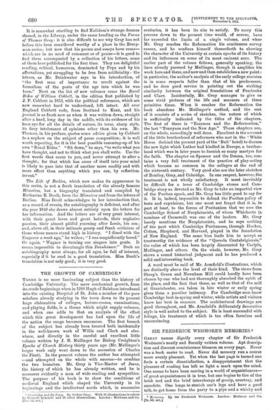EVERYMAN'S LIBRARY.*
OF the making of books there is indeed no end. Half-a- century ago, no one had thought it possible to buy, for a shilling, all those books most worth the reading. Yet here are the promised new volumes, forty in number, of Everyman's Library, bringing the strength of its legions up to six hundred and forty volumes, published since January 1906. The series is by now so well known that it goes without saying that they are well printed, comfortable to hold, and pleasant to read; and that there are fresh additions to each of the familiar contrasting bindings : to scarlet Fiction, and purple Reference, and dark Travel and Topography.
First on the list comes Sakuntala, and other Works, of Kalidasa, translated by Arthur W. Ryder, University of California. About the fifth century A.D., when Hindu civiliza- tion was worthy to take its place among those of Rome or London or Paris in their great days, the city of Ussain, in especial, became, under KingVikramaditya, a centre of learning, of art, and of poetry, and at the Court of the King the greatest of the poets was Kalidasa. Seven of his works remain—three dramas, three epics, and one descriptive poem, and from time to time attempts have been made to translate them. Mr. Ryder has now given us a fresh version, cutting down and explaining some of the longer poems. It is, of course, impossible to reproduce truly, in twentieth-century English, Sanskrit of the sixth century : in the original the dramas are, without doubt, tender and majestical ; but the average man, otherwise unacquainted with Sanskrit literature, finds it difficult to trace the spirit of early Hinduism in the ill-fitting garb of modern English prose. Indeed, the translation of Kalidasa's works is hardly likely to be read for its own sake, but seems rather to take its place as a commentary on Mr. Ryder's quite delightful introduction, where his real knowledge and real appreciation of the writer and of the period carry us farther than can any translation into the understanding of Hindu literature.
* Everyman's Library. Forty new volumes. London : J. M. Dent and Sous. [Is. net.] It is somewhat startling to find Kalidasa's strange dramas classed, in the Library, under the same heading as the Poems of Thomas Gray : it is also difficult to see why Gray has not before this been considered worthy of a place in the Every- man series; but now that his poems and essays have come— which are in no need of comment or of praise—it is good to find them accompanied by a collection of his letters, some of them here published for the first time. They are delightful reading, critical, humorous, dominated by Pope and by his affectations, yet struggling to be free from artificiality : the letters, as Mr. Drinkwater says in his introduction, of "the first man of importance to revolt against the formalism of the poets of the age into which he was born." Next on the list of new volumes come the Rural Rides of William Cobbett, in the edition first published by J. P. Cobbett in 1853, with the political references, which are now somewhat hard to understand, left intact. All over England Cobbett rode, from Scotland to Kent, and his journal is as fresh now as when it was written down, straight after a hard, long day in the saddle, with its evidence of his keen eye for all the details of nature, its terse, sharp style, its fiery intolerance of opinions other than his own. Mr. Thomas, in his preface, quotes some advice given by Cobbett to a nephew on the subject of prose composition; it is well worth repeating, for it is the best possible summing-up of his own "Rural Rides." " Sit down," he says, "to write what you have thought, and not to think what you shall write. Use the first words that occur to you, and never attempt to alter a thought; for that which has come of itself into your mind is likely to pass into that of another more readily and with more effect than anything which you can, by reflection, invent."
The Life of Berlioz, which now makes its appearance in this series, is not a fresh translation of the already famous _lifemoires, but a biography translated and compiled by Katharine E. Boult, from the lifemoires and from the letters of Berlioz. Miss Boult acknowledges in her introduction that, as a record of events, the autobiography is deficient, and after the year 1848 she draws almost entirely upon the letters for her information. And the letters are of very great interest, with their great loves and great hatreds, their explosive passion, their almost pitiful yearning after Louis, his son ; and, above all, in their intimate gossip and frank criticism of those whose names stand high in history. "I dined with the Emperor a week ago," he writes; " I was magnificently bored." Or again, " Wagner is turning our singers into goats. It seems impossible to disentangle this Tanultiiuser." Such an autobiography must always, for all ages, be full of interest, especially if it be read in a good translation. Miss Boult's translation is not only good ; it is very good.



























































 Previous page
Previous page